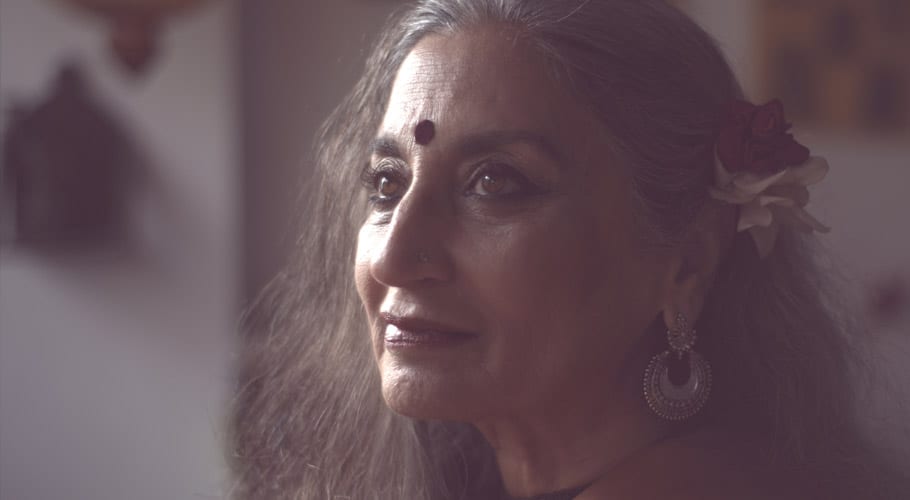Bold yet graceful, Pakistan’s renowned classical dancer has made it her mission to empower oppressed women and fight against injustice.
Defying acts of terrorism Sheema Kermani performed at Lal Shahbaz Qalandar’s shrine merely a day after a blast killed 85 people to counter the hate. Through her dance, she highlights the physical and psychological violence women face in our society. As a social activist and founder of Tehrik-e-Niswan she has played a pivotal role in the Aurat March. We had to find out more about her tremendous journey.
MM: What drew you towards classical dance?
Sheema Kermani: My early exposure to classical dance was through my mother. My maternal grandparents were living in Hyderabad Deccan and my mother would take us children in the late 1950’s right until the war in 1965 to Hyderabad to visit her parents in the summer vacations.
Here an Ustaad would come to teach her and her sisters a classical dance at home. My mother would practice it the years round till we would go back the next year and she would get lessons again from her Ustaad. So this was my initial exposure.
However, till the age of thirteen, my parents were constantly posted in small towns and cantonments where there were no dance teachers. When we were posted to Karachi in 1964 my mother found a couple, Mr. and Mrs. Ghanysham who had an institute where the classical arts were taught and I was sent to learn classical dance with them.
I took classes throughout my school years but it was later when I had returned after being at Art College in London that I went back to them and took up learning seriously and professionally. Then I decided to go to India for further lessons.
This was in the early 1980s and General Zia ul Haq had already but a ban on the classical dance performed by women on stage or any media. I decided that I will dance and no one has the right to stop me!
MM: Did you ever face any backlash for your performances and how did you deal with it?
Sheema Kermani: So I used to perform with the Ghanshyams troupe until they had to leave Pakistan in 1983 because of the ban on dance. However, I continued performing and teaching and was the only dancer in Pakistan for almost a decade as all the others had left the country.
Since it was banned and one had to get NOC (No Objection Certificate) for any kind of public performance, it became very difficult and every time I performed it was at the risk of my life. In those days I used to get many threats, even the venues where I was performing sometimes got threats, the fundamentalists were on the rise, and the society was going through ‘Islamisation’ so yes there was always a backlash.
This has continued till date and the only way to deal with it is to take it with a sense of humour and of course to perform as an act of defiance and resistance.
MM: That one moment or person which inspired you to begin Tehrik-e-Niswan?
Sheema Kermani: When I returned to Pakistan after my studies, I wanted to work with the most oppressed of all and I found that the most oppressed were the working-class women of Pakistan. So I started working with them and organized them in Trade Unions etc.
During this, I found that women would never speak up at meetings, that they were not only outnumbered but were discriminated against by their male colleagues and this is what inspired me to begin Tehrik-e-Niswan as a political action to empower, motivate and encourage women to stand and struggle for their rights.
MM: Tehrik-e-Niswan’s biggest achievement to date is?
Sheema Kermani: So Tehrik-e-Niswan began in 1979 and ever since the beginning it has used the performing arts as a medium to give Rights messages to women and the marginalized communities. In these 40 years, Tehrik has achieved much – perhaps the greatest achievement is that today the term ‘Women’s Rights’ is on everyone’s tongue and the fact that today women are standing up and demanding their rights. Forty years ago no one could imagine that this would be possible.
Besides this, I consider the rise of theatre and the performing arts in Pakistan is also due to the struggle of Tehrik-e-Niswan. Right from its inception, Tehrik has brought socially relevant theatre to the public, to the masses, to those who never get an opportunity to see theatre!
This has been a great achievement. Today organisations, corporations, and all those who work on Rights’ issues understand the importance and the impact our work has had in the terms of bringing theatre and the performing arts as a medium for creating awareness, for giving messages of human rights to people.
MM: Three greatest misconceptions people have about artists?
Sheema Kermani: I think the first misconception about artists is that artists and art are not important to society. I believe that artists and art are perhaps the most important aspect of society. A society without artists is a dead society.
The other misconception about artists is that they do not need to perform professionally, i.e. that they should perform free! Even today I am often asked not to charge a fee for my performances while people are willing to pay enormous amounts for eating, they are not willing to pay for art and artists. This needs to change.
Thirdly I feel that there is a huge misconception about the place of artists in society. Artists are still considered low on the ladder of respect in society. My Ustaad once said to me that this society is not willing to give either money nor ‘izzat’ to artists.
MM: Are ‘theatre’ and ‘dance’ a dying art in Pakistan, if so, how can it be revived?
Sheema Kermani: Yes, I believe that theatre and dance are dying arts in Pakistan. Well actually Pakistan never really considered these arts of any value but at present with the rise of religious bigotry, fundamentalism and obscurantism this situation has become worse.
As society moves towards greater materialism the finer aspects of life are ignored and money, wealth, and power become most important. Besides this people want everything without hard work and sweat- “instant”! Classical arts cannot be acquired overnight, they need years of dedication and perseverance.
These values have been lost in present Pakistan and mediocrity prevails. The revival of these arts will mean a determined effort on the part of the state and government to support those artists who are pushing the edge on their own, to build auditoriums and to support repertory companies.
MM: Your thoughts on the depiction of women in Pakistani films and dramas?
Sheema Kermani: I do not think there is any film industry in Pakistan of any worth to talk about. As for TV dramas – the depiction of women is not only pathetic but I would go as far as to say that it is criminal.
There are only 2 types of women:
1- The Nek Parween who worships her husband, even if he is violent, abusive, and a philander.
2- The Vamp who wants to go out and work, she is always shown as a ‘bad’ woman.
TV dramas never show the real woman of our country, the working woman who struggles to live a life of dignity, the woman who represents the dreams of the women of Pakistan.
MM: What was the success factor behind Aurat March this year and what can we expect next year?
Sheema Kermani: We started Aurat March in 2018, this year was the 3rd Aurat March, and not only the number of participants has been increasing but its impact has shaken the establishment. Parliament, Assemblies, Media, and all institutions of patriarchy have been forced to acknowledge the impact of Aurat March and we expect this to become more and more.
MM: What would you say to people who insist a woman’s life is incomplete without marriage?
Sheema Kermani: I would say that it is the right of every woman to decide if she wants to marry or not if she wants children or not, and when she wants to marry. I personally believe that the institution of marriage is certainly not the end at all and that women have the right to live to their full potential with the right to decide about their life.
MM: One thing every woman should always remember?
Sheema Kermani: Every woman must remember that she is important, she is strong, and that no one has the right to violate her. Her mind and her body belong to herself and she must have the right to decide about her life. Women should remember that the strength lies within them and once they have been able to get in touch with this inner strength…no one will be able to take it away from them and nothing can then stop them from deciding about their own life!





































